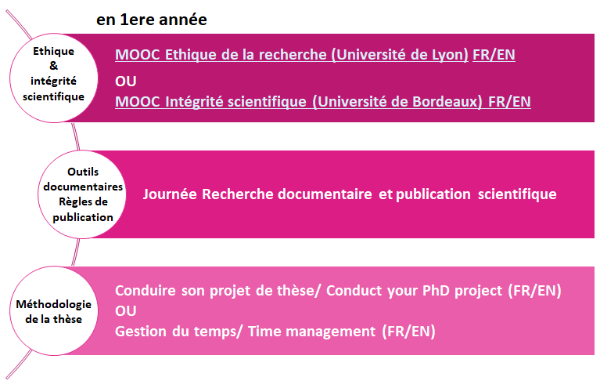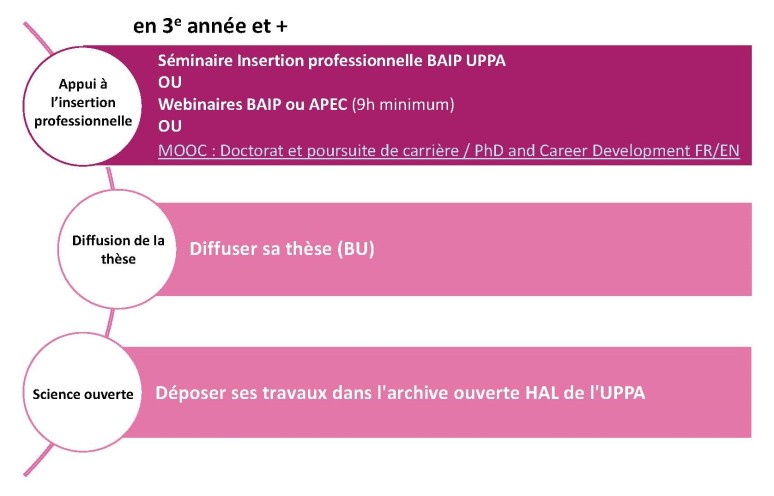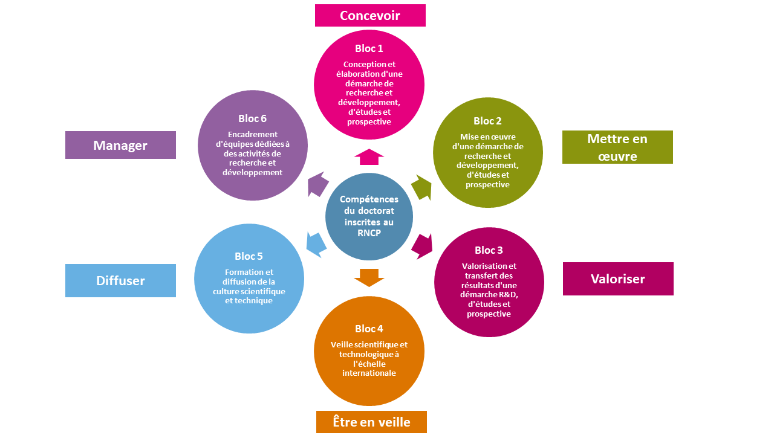Training
In addition to laboratory research, a PhD program includes compulsory training courses and non-research activities that contribute to the development of the skills expected of future PhDs in accordance with current regulations:
- 2016 May 25 Decree (modified by 2022 August 26 Decree), establishing the national framework for training and the procedures leading to the award of the national doctoral diploma
- 2019 February 22 Decree, defining the skills of doctoral graduates and registering the doctorate in the national repertoire of professional certification
To fulfill the requirements for doctoral training, the Centre des Etudes Doctorales and UPPA provide compulsory training courses (most of which can be chosen from several modules), as well as language, scientific and professional training courses. PhD students must have completed 150 hours of training before defending their thesis.
In compliance with the decree of 25 May 2016,
- All PhD students must take courses that promote interdisciplinary learning and the acquisition of a broad scientific culture, including knowledge of the international research framework:
- training in research ethics and scientific integrity,
- training in pedagogy if the doctoral student's professional project,
- training to support professional integration
UPPA requires doctoral students to complete 150 hours of training during their thesis. The hours and associated RNCP skills will be recorded in their ADUM account.
-
The thesis supervisor and the PhD student must sign an individual training agreement (CIF) that specifies, among other things, the doctoral student's professional project and his/her individual training programme in relation to this project.
Before starting their second year, doctoral students must submit their individual training agreement (CIF) to ADUM. The agreement must have been validated by their thesis supervisor(s).
-
The PhD student regularly updates their portfolio, which lists all their activities during their training, including teaching, dissemination of scientific culture and technology transfer. The portfolio highlights the skills they have developed during their doctoral studies.
Prior to defending their thesis, PhD students should edit their portfolio in their ADUM account. This involves summarising all training courses and other activities they have completed, and indicating the total number of hours allocated.
In compliance with the decree of 22 February 2019,
- The award of a doctorate certifies the ability to produce new, high-level scientific knowledge and the mastery of skills common to all doctorates, acquired through research.
In their ADUM account, PhD students have access to a Catalogue of training courses by RNCP skills and a Self-evaluation module for skills acquired. See § 3 - Training & skills
How to build a 150-hour Individual Training Plan
Select from the ADUM catalogue (§ 4 - Sign up for training and catalogue 2024/25):
- interdisciplinary courses offered by the Centre des Etudes Doctorales (CED) or by the Service Commun de Documentation (SCD) (Library) - including mandatory training,
- specific Doctoral School courses,
- language courses offered by the Centre de Ressources en Langues (CRL), preparing for optional certifications: Cambridge (English), Dele (Spanish) and Dalf-Delf (French),
- courses from others universities opened in ADUM catalogue for all students
Declaration of external training courses (§ 5 - Off-catalogue trainings) :
- trainings offered by other UPPA departments (SCUIO-BAIP, SUP-ARTICE, DRH...) and research units,
- also declare "off-catalogue" all external courses (ex: MOOCs, cotutelle universities, colloquia...).
Declaring other doctoral activities that can be recognized (§ 6 - Other capitalizable activities
- publications, participation in international conferences, international mobility, teaching, elective mandates, etc.
Barème training hours 2025/2026
Why mandatory training?
To meet the requirements of doctoral training legislation, in particular:- research ethics and scientific integrity;
- raising doctoral students' awareness of the challenges of open science and the dissemination of research work in society;
- support for career development;
- European and international openness;
- acquisition and mastery of skill sets common to all doctors.
List of compulsory courses
You are not obliged to take all the courses on this list, but you can choose from a number of options for most of them: Barème 2025/2026
- 3 modules to be completed preferably in 1st year:
Research ethics/scientific integrity (2 choices) - Documentation tools and publication rules - Thesis methodology (2 choices)
Since training in research ethics and scientific integrity is mandatory by decree, the awarding of the doctoral diploma is conditional on the completion of one of the MOOCs: Research Ethics (U. Lyon) or Scientific Integrity (UBx) or equivalent training.
These two MOOCs are complementary, and it is possible to take and validate both of them, as well as several compulsory training courses from the same choice list.
- 2 skills to be acquired preferably in 1st or 2nd year:
Communication (several choices) - Entrepreneurship (several choices)
- 3 modules to be validated before the thesis defence:
Support for professional integration (several choices) - Dissemination of the thesis - Open science
These last 2 training courses must be completed - before the thesis is submitted in ADUM for the defence.
BAIP or APEC webinars must be declared as 'out of catalog' in ADUM by grouping them together with a minimum of 9 hours and a single PDF containing all supporting evidence. Exemptions from the Professional Integration module may be granted to part-time doctoral students (on a case-by-case basis) or retired individuals.
- 1 module to be validated for PhD students teaching at UPPA:
Teaching and pedagogy
PhD students who are professional Teachers in other institutions are exempt from taking this course.
A few clarifications
Equivalent courses may be validated as compulsory courses if they replace a module on the list.
Hours of trainings and registration procedures for compulsory courses are detailed in the table below:
Barème Formations obligatoires 2025/26
In addition to the compulsory courses,
- A webinar detailing the sub-competences of the 6 blocks and the recommended training to acquire them is available on the ED's INTRANET, in "Doctoral student tools".
- ADUM offers doctoral students a skills self-assessment module entitled "Procedure for skills self-assessment" to help them identify the training courses and actions needed to achieve their objectives.
- To help them organise their career, doctoral students also have access to a Catalogue of RNCP skills training courses in their ADUM account.
- A webinar detailing the sub-competences of the 6 blocks and the recommended training to acquire them is available on the ED's INTRANET, in "Doctoral student tools".
Registration for CED, SCD, or ED courses:
from the catalogue of your ADUM profile (Right-hand menu: Training / Catalogue / § Other training courses) and your doctoral school's training courses will appear first: ADUM
or via direct link to the CED 2025/26 catalogue: Catalogue CED-SCD 2025/26 and registrationSelect the course of your choice to view description and planning, and to register.
Courses managed by other UPPA departments or laboratories are advertised via the doctoral students' mailing list, with details of how to register provided by the organisers. Some are included in the CED catalogue with registration in ADUM in order to validate hours directly.
The complete catalogue of your ADUM profile also allows you to register for courses at partner universities
open to all PhD students in the network.
Registrations for off-catalogue courses should be made directly with the organisers.
These courses must be declared as ‘external training courses’ in your ADUM profile, with supporting documentation submitted for validation (see §5 - Off-catalogue courses).
Training courses taken outside the CED can also be capitalized in the individual training plan, for example, training courses taken at other universities (cotutelle) or organizations (INRAE, CNRS...), in companies (CIFRE)...
To be validated, these training courses must be declared as "external training courses" in your ADUM profile (right-hand menu) and be attested by proof of attendance with the detailed programme (in a single pdf file) and, if possible, with the RNCP skills sheet associated with this training course, signed or stamped by the organiser. ED Management will examine requests on a case-by-case basis.
Many courses are available online:
UPPA's Bureau d'Aide à l'Insertion Professionnelle (baip@univ-pau.fr) helps students and prepares them for their professional integration. Webinars from the BAIP or APEC (Association pour l'Emploi des Cadres) must be declared as "hors catalogue" in ADUM by grouping them together with a minimum of 4 hours and a single pdf containing all the supporting documents.
NB: 9 hours of BAIP or APEC webinars validate the compulsory professional integration module.
_____________
Webinaires DAP/ Courses E-learn
The DAP (Direction d'Accompagnement à la Pédagogie, formerly SUP), UPPA's teaching support service, offers doctoral students responsible for teaching resources for face-to-face, distance and blended learning. On their website, you will find tutorials, a training and webinar calendar, and a detailed catalogue.
- These should be declared as ‘outside the catalogue’ in ADUM, grouping them together with a minimum of 4 hours and a single PDF file containing all supporting documents
_____________
The Unité Régionale de Formation à l'Information Scientifique et Technique de Bordeaux (URFIST) is an inter-university training service whose mission is to develop mastery of scientific and technical information and communication: scientific writing; collection, production and management of digital data; promotion of scientific work, etc.
Urfist offers training courses organized by semester and on request, as well as study days._____________
Fun is a platform for online courses (MOOC). These courses are created by higher education establishments and partners. Depending on the course, you can earn a tracking badge or (free or paying) optional certification.
Fun also offers paid Gradeo courses leading to certificates. The courses are open to anyone wishing to acquire new knowledge and strengthen their personal or professional skills.Some recommended courses on Fun-MOOC in french or english:
- MOOC Recherche reproductible : principes méthodologiques pour une science transparente
- MOOC La science ouverte de Sorbonne Université
- MOOC Se Former pour Enseigner dans le Supérieur
_____________
MyMOOC presents several thousand free online training courses and paying or free certification courses available at any time, with a complete catalog of online resources (project management, IT, foreign language learning...).
_____________
The PhDOOC association offers doctoral students and PhD graduates a MOOC, a free online course, to raise awareness of existing and accessible tools and resources. This collaborative training programme allows them to progress at their own pace, working around their time constraints and availability, while drawing on the support of a community.
Completion of MOOC Doctorat et Poursuite de Carrière - PhD and Career Development
validates the compulsory professional integration module.To validate other activities undertaken during the doctoral programme, they must be declared in ADUM under ‘external training' (right menu) and supporting documentation must be provided. A flat rate per hour is allocated for each type of activity according to a scale established by the CED.
List of activities eligible
Other training courses
- External training courses: UPPA, laboratories, in-company, other universities, etc.
- MOOCs
- Master module or équivalent, University Diploma, etc.
Scientific activities
- Laboratory seminars
- Disciplinary study day: participation, contribution
- Participation in spring/summer/winter school
- Conference or symposium: participation, poster, oral presentation
- Minimum two-week stay abroad (including in joint supervision agreement)
- Publication(s) in a journal or conference proceedings, with peer review
- Scientific awards and distinctions at a conference
Scientific mediation
- Science initiatives with and for society (details in Barème)
- Public events
- Organisation of laboratory visits
Professional experience
- Organisation Disciplinary Study Day (not combinable with simple participation)
- Commitment to associations (UPPA or external)
- Involvement in the life of the ED: ED council representatives, QVT, etc.
- Involvement in the life of the institution: elected positions, working groups, etc.
- Supervision of Master's students (on a case-by-case basis, with supporting documentation)
- Mentoring of interns (secondary school or sixth form students)
- Internships (on a case-by-case basis, with supporting documentation)
- Teaching activities
Allocated hours
To find out how many hours can be validated for each activity, consult the scale below:
Barème 2025/26 eligible activities
Other activities may be validated on a case-by-case basis.
Only activities carried out during the thesis can count towards training hours; otherwise, only the skills acquired will be validated.




